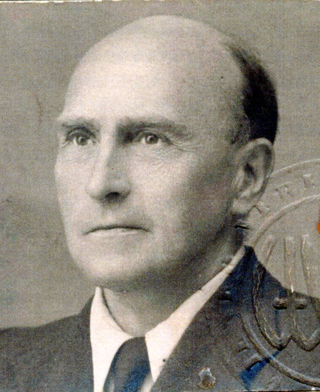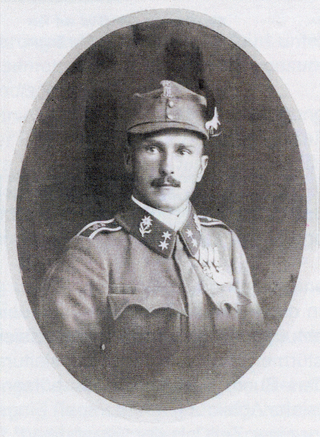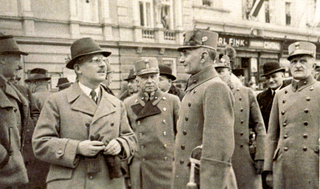Oberstleutnant Georg Bartl

Personalia
Born:
Died:
Profession:
Persecution:
Released 15.03.1938,
Imprisonment 28.05.1938 - 02.09.1938,
Dachau concentration camp 02.09.1938 - 28.09.1939,
Mauthausen concentration camp 28.09.1939 - 15.07.1940
KZ Number:
Honors:
Silver Medal of Merit
Cross of Military Merit III Class
Charles Troop Cross
Iron Cross II Class
Austrian Cross of Military Merit
Curriculum Vitae
He was assigned to the Kaiserschützenregiment Nr. 2 'Bozen', promoted to first lieutenant on August 1, 1914 and sent to the Italian front at the beginning of the First World War. On May 15, 1916, he was promoted 'outside the rank tour' to captain. After the general staff course in 1917, he was with the 45th Rifle Division Command in Volhynia and Gallicia from June to December 1917, before becoming a general staff officer with the V Corps Command on the Italian front. On July 1, 1918, he married Edith von Schullern and their son was born in 1919.
On November 4, 1918, one day after the surrender of Austria-Hungary, he was taken prisoner of war in Italy, from where he returned home at the end of August 1919.
As it was not yet possible for him to join the new Austrian Armed Forces, Georg Bartl was a liaison officer at the Inter-Allied Military Control Commission in Innsbruck from January 1920 to October 1920 and then in the personnel department of the Army Administration Office in Innsbruck. On August 1, 1923, he joined the Austrian army and was promoted to major on January 19, 1928.
In Tyrol, Georg Bartl experienced the National Socialist coup attempt in July 1934, during which Federal Chancellor Engelbert Dollfuss was assassinated. On August 1, 1934, he was transferred to Vienna to the Federal Ministry of Defence and appointed as personal adjutant to the Federal Chancellor and Federal Minister of Defence Kurt von Schuschnigg.

As a staunch Austrian and member of the Vaterländische Front, Georg Bartl vehemently opposed Hitler's attempts to reach out to Austria. He took decisive action against National Socialists in the army and published under the pseudonym 'Austriacus' in various Vaterländische Front magazines.
[...]
In the complaint filed by the former national leadership of the Austrian NSDAP, Bartl was accused of having acted in a spiteful manner against National Socialists. He is said to have personally intervened in the massacre of Nazi-minded soldiers and gave orders for these soldiers to be handcuffed and taken away. In doing so, he is said to have commented that "these bastards are to be shot over the head if they move."
The investigations led to the conclusion that Bartl was a ruthless persecutor of those who declared their allegiance to the NSDAP in the former Austria, exerting decisive pressure on the former State Secretary Zehner and other military unit leaders in the persecution of National Socialist members of the Wehrmacht.
On June 25, 1935, Georg Bartl was promoted to lieutenant colonel, once again 'outside the rank tour'. On March 12, 1938, he witnessed the demise of free and independent Austria with the invasion of the German Wehrmacht. At the time, he was staying in the apartment of Federal Chancellor Kurt von Schuschnigg. On the morning of March 12, 1938, he was arrested and cut off from the outside world together with Chancellor Kurt von Schuschnigg, his wife Vera von Schuschnigg, the Chancellor's father Field Marshal Lieutenant Arthur von Schuschnigg and two domestic servants.
When Georg Bartl was allowed to leave the apartment, he refused to take the military oath to Adolf Hitler, whereupon he was forced to retire on March 15, 1938. He was arrested by the Gestapo on May 28, 1938 and deported to the Dachau concentration camp on September 2, 1938. When the Dachau concentration camp had to be cleared for the SS following the invasion of Poland in 1939, Georg Bartl was transferred to the Mauthausen concentration camp on September 28, 1939. He was released there on July 15, 1940.

His marriage to Edith von Schullern broke up in 1940, and in 1942 he married Edda Bissakis, née von Thoss. They bought a house in Kierling near Klosterneuburg in Lower Austria and settled there. During this time, Georg Bartl worked as a gardener to make ends meet.
On April 8, 1945, Georg and Edda Bartl were waiting for liberation in their house when the Russians set out for the Battle of Vienna and marched through Kierling. Fearing the Russians, a tinsmith's assistant with his wife, his twelve and twenty-year-old daughters and the daughter of Major General Adalbert Szente fled to the Bartl's house, as they felt safe with a former concentration camp inmate. A Russian battery is established not far from the house. The Russian soldiers entered the house on the afternoon of April 9, 1945 and raped all the women. This traumatic event led to the collective suicide of everyone in the house on the same day.
Places
Residence:
Persecution:
Citations
Österreichisches Staatsarchiv (ÖStA)
Verein Museum Kierling (2013): Bedeutende Offiziere Kierlings. Obst Leopold Schmid. Obstlt Georg Bartl. Hptm. Prof. Edmund Rothansl (Kierling), S.84-94.
Archiv KZ Gedenkstätte Mauthausen Memorial
Matricula Online
